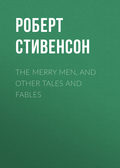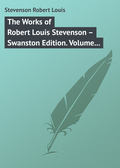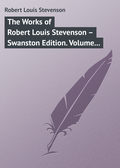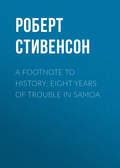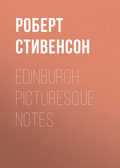
Роберт Льюис Стивенсон
The Works of Robert Louis Stevenson – Swanston Edition. Volume 23
To Charles Baxter
The memory here evoked of Brash the publican, who had been a special butt for some of the youthful pranks of R. L. S. and his friends, inspired in the next few weeks the sets of verses mentioned below (vol. 24, pp. 14, 15, 38) in letters which show that the fictitious Johnson and Thomson were far from being dead.
[Chalet am Stein], Davos, December 5, 1881.
MY DEAR CHARLES, – We have been in miserable case here; my wife worse and worse; and now sent away with Lloyd for sick nurse, I not being allowed to go down. I do not know what is to become of us; and you may imagine how rotten I have been feeling, and feel now, alone with my weasel-dog and my German maid, on the top of a hill here, heavy mist and thin snow all about me, and the devil to pay in general. I don’t care so much for solitude as I used to; results, I suppose, of marriage.
Pray write me something cheery. A little Edinburgh gossip, in Heaven’s name. Ah! what would I not give to steal this evening with you through the big, echoing, college archway, and away south under the street lamps, and away to dear Brash’s, now defunct! But the old time is dead also, never, never to revive. It was a sad time too, but so gay and so hopeful, and we had such sport with all our low spirits and all our distresses, that it looks like a kind of lamplit fairyland behind me. O for ten Edinburgh minutes – sixpence between us, and the ever-glorious Lothian Road, or dear mysterious Leith Walk! But here, a sheer hulk, lies poor Tom Bowling; here in this strange place, whose very strangeness would have been heaven to him then; and aspires, yes, C. B., with tears, after the past. See what comes of being left alone. Do you remember Brash? the sheet of glass that we followed along George Street? Granton? the night at Bonny mainhead? the compass near the sign of the Twinkling Eye? the night I lay on the pavement in misery?
I swear it by the eternal sky
Johnson – nor – Thomson ne’er shall die!
Yet I fancy they are dead too; dead like Brash.
R. L. S.
To Mrs. Thomas Stevenson
The next is after going down to meet his wife and stepson, when the former had left the doctor’s hands at Berne.
Chalet Buol, Davos-Platz, December 26, 1881.
MY DEAR MOTHER, – Yesterday, Sunday and Christmas, we finished this eventful journey by a drive in an open sleigh – none others were to be had – seven hours on end through whole forests of Christmas trees. The cold was beyond belief. I have often suffered less at a dentist’s. It was a clear, sunny day, but the sun even at noon falls, at this season, only here and there into the Prättigau. I kept up as long as I could in an imitation of a street singer: —
“Away, ye gay landscapes, ye gardens of roses,” etc.
At last Lloyd remarked, a blue mouth speaking from a corpse-coloured face, “You seem to be the only one with any courage left?” And, do you know, with that word my courage disappeared, and I made the rest of the stage in the same dumb wretchedness as the others. My only terror was lest Fanny should ask for brandy, or laudanum, or something. So awful was the idea of putting my hands out, that I half thought I would refuse.
Well, none of us are a penny the worse, Lloyd’s cold better; I, with a twinge of the rheumatiz; and Fanny better than her ordinary.
General conclusion between Lloyd and me as to the journey: A prolonged visit to the dentist’s, complicated with the fear of death.
Never, O never, do you get me there again. – Ever affectionate son,
R. L. S.
To Edmund Gosse
Mr. Gosse and R. L. S. had proposed to Mr. R. W. Gilder, of the Century Magazine, that they should collaborate for him on a series of murder papers, beginning with the Elstree murder; and he had accepted the proposal on terms which they thought liberal.
Hotel Buol, Davos, Dec. 26, 1881.
MY DEAR GOSSE, – I have just brought my wife back, through such cold, in an open sleigh too, as I had never fancied to exist. I won’t use the word torture, but go to your dentist’s and in nine cases out of ten you will not suffer more pain than we suffered.
This is merely in acknowledgment of your editorial: to say that I shall give my mind at once to the Murder. But I bethink me you can say so much and convey my sense of the liberality of our Cousins, without exhibiting this scrawl. So I may go on to tell you that I have at last found a publisher as eager to publish, as I am to write a Hazlitt. Bentley is the Boy; and very liberal, at least, as per last advices; certainly very friendly and eager, which makes work light, like whistling. I wish I was with the rest of – well, of us – in the red books. But I am glad to get a whack at Hazlitt, howsoe’er.
How goes your Gray? I would not change with you; brother! Gray would never be suited to my temperament, while Hazlitt fits me like a glove.
I hope in your studies in Young Folks you did not miss the delicious reticences, the artistic concealments, and general fine-shade graduation, through which the fact of the Xmas Nr. being 3d. was instilled – too strong – inspired into the mind of the readers. It was superb.
I may add as a postscript: I wish to God I or anybody knew what was the matter with my wife. – Yours ever,
Robert Louis Stevenson.
To Sidney Colvin
[Chalet am Stein, Davos-Platz, March 1882.]
MY DEAR COLVIN, – Herewith Moral Emblems. The elephant by Fanny – the rest by me.
I would have sent it long ago. But I must explain. I brought home with me from my bad times in America two strains of unsoundness of mind, the first, a perpetual fear that I can do no more work – the second, a perpetual fear that my friends have quarrelled with me.43 This last long silence of yours drove me into really believing it, and I dared not write to you.
Well, it’s ancient history now, and here are the emblems. A second series is in the press.
Silverado is still unfinished; but I think I have done well on the whole, as you say. I shall be home, I hope, sometime in May, perhaps before; it depends on Fanny’s health, which is still far from good and often alarms me. I shall then see your collectanea. I shall not put pen to paper till I settle somewhere else; Hazlitt had better simmer awhile. I have to see Ireland too, who has most kindly written to me and invited me to see his collections.
Symonds grows much on me: in many ways, what you would least expect, a very sound man, and very wise in a wise way. It is curious how F. and I always turn to him for advice: we have learned that his advice is good. – Yours ever,
R. L. S.
To Alison Cunningham
[Chalet am Stein, Davos-Platz, February 1882.]
MY DEAR CUMMY, – My wife and I are very much vexed to hear you are still unwell. We are both keeping far better; she especially seems quite to have taken a turn —the turn, we shall hope. Please let us know how you get on, and what has been the matter with you; Braemar I believe – the vile hole. You know what a lazy rascal I am, so you won’t be surprised at a short letter, I know; indeed, you will be much more surprised at my having had the decency to write at all. We have got rid of our young, pretty, and incompetent maid; and now we have a fine, canny, twinkling, shrewd, auld-farrant peasant body, who gives us good food and keeps us in good spirits. If we could only understand what she says! But she speaks Davos language, which is to German what Aberdeen-awa’ is to English, so it comes heavy. God bless you, my dear Cummy; and so says Fanny forbye. – Ever your affectionate,
Robert Louis Stevenson.
To Charles Baxter
[Chalet am Stein, Davos], 22nd February ’82.
MY DEAR CHARLES, – Your most welcome letter has raised clouds of sulphur from my horizon…
I am glad you have gone back to your music. Life is a poor thing, I am more and more convinced, without an art, that always waits for us and is always new. Art and marriage are two very good stand-by’s.
In an article which will appear some time in the Cornhill, Talk and Talkers, and where I have full-lengthened the conversation of Bob, Henley, Jenkin, Simpson, Symonds, and Gosse, I have at the end one single word about yourself. It may amuse you to see it.
We are coming to Scotland after all, so we shall meet, which pleases me, and I do believe I am strong enough to stand it this time. My knee is still quite lame.
My wife is better again… But we take it by turns; it is the dog that is ill now. – Ever yours,
R. L. S.
To W. E. Henley
In the early months of this year a hurt knee kept Stevenson more indoors than was good for him.
[Chalet am Stein, Davos-Platz, February 1882.]
MY DEAR HENLEY, – Here comes the letter as promised last night. And first two requests: Pray send the enclosed to c/o Blackmore’s publisher, ’tis from Fanny; second, pray send us Routledge’s shilling book, Edward Mayhew’s Dogs, by return if it can be managed.
Our dog is very ill again, poor fellow, looks very ill too, only sleeps at night because of morphine; and we do not know what ails him, only fear it to be canker of the ear. He makes a bad, black spot in our life, poor, selfish, silly, little tangle; and my wife is wretched. Otherwise she is better, steadily and slowly moving up through all her relapses. My knee never gets the least better; it hurts to-night, which it has not done for long. I do not suppose my doctor knows any least thing about it. He says it is a nerve that I struck, but I assure you he does not know.
I have just finished a paper, A Gossip on Romance, in which I have tried to do, very popularly, about one-half of the matter you wanted me to try. In a way, I have found an answer to the question. But the subject was hardly fit for so chatty a paper, and it is all loose ends. If ever I do my book on the Art of Literature, I shall gather them together and be clear.
To-morrow, having once finished off the touches still due on this, I shall tackle San Francisco for you. Then the tide of work will fairly bury me, lost to view and hope. You have no idea what it costs me to wring out my work now. I have certainly been a fortnight over this Romance, sometimes five hours a day; and yet it is about my usual length – eight pages or so, and would be a d – d sight the better for another curry. But I do not think I can honestly re-write it all; so I call it done, and shall only straighten words in a revision currently.
I had meant to go on for a great while, and say all manner of entertaining things. But all’s gone. I am now an idiot. – Yours ever,
R. L. S.
To W. E. Henley
The following flight of fancy refers to supposed errors of judgment on the part of an eminent firm of publishers, with whom Stevenson had at this time no connection. Very soon afterwards he entered into relations with them which proved equally pleasant and profitable to both parties, and were continued on the most cordial terms until his death.
[Chalet am Stein, Davos, March 1882.]
MY DEAR HENLEY, – Last night we had a dinner-party, consisting of the John Addington, curry, onions (lovely onions), and beefsteak. So unusual is any excitement, that F. and I feel this morning as if we had been to a coronation. However I must, I suppose, write.
I was sorry about your female contributor squabble. ’Tis very comic, but really unpleasant. But what care I? Now that I illustrate my own books, I can always offer you a situation in our house – S. L. Osbourne and Co. As an author gets a halfpenny a copy of verses, and an artist a penny a cut, perhaps a proof-reader might get several pounds a year.
O that Coronation! What a shouting crowd there was! I obviously got a firework in each eye. The king looked very magnificent, to be sure; and that great hall where we feasted on seven hundred delicate foods, and drank fifty royal wines —quel coup d’œil! but was it not overdone, even for a coronation – almost a vulgar luxury? And eleven is certainly too late to begin dinner. (It was really 6.30 instead of 5.30.)
Your list of books that Cassells have refused in these weeks is not quite complete; they also refused: —
1. Six undiscovered Tragedies, one romantic Comedy, a fragment of Journal extending over six years, and an unfinished Autobiography reaching up to the first performance of King John. By William Shakespeare.
2. The Journals and Private Correspondence of David, King of Israel.
3. Poetical Works of Arthur, Iron Dook of Wellington including a Monody on Napoleon.
4. Eight books of an unfinished novel, Solomon Crabb. By Henry Fielding.
5. Stevenson’s Moral Emblems.
You also neglected to mention, as per contra, that they had during the same time accepted and triumphantly published Brown’s Handbook to Cricket, Jones’s First French Reader, and Robinson’s Picturesque Cheshire, uniform with the same author’s Stately Homes of Salop.
O if that list could come true! How we would tear at Solomon Crabb! O what a bully, bully, bully business. Which would you read first – Shakespeare’s autobiography, or his journals? What sport the monody on Napoleon would be – what wooden verse, what stucco ornament! I should read both the autobiography and the journals before I looked at one of the plays, beyond the names of them, which shows that Saintsbury was right, and I do care more for life than for poetry. No – I take it back. Do you know one of the tragedies – a Bible tragedy too —David– was written in his third period – much about the same time as Lear? The comedy, April Rain, is also a late work. Beckett is a fine ranting piece, like Richard II., but very fine for the stage. Irving is to play it this autumn when I’m in town; the part rather suits him – but who is to play Henry – a tremendous creation, sir. Betterton in his private journal seems to have seen this piece; and he says distinctly that Henry is the best part in any play. “Though,” he adds, “how it be with the ancient plays I know not. But in this I have ever feared to do ill, and indeed will not be persuaded to that undertaking.” So says Betterton. Rufus is not so good; I am not pleased with Rufus; plainly a rifaccimento of some inferior work; but there are some damned fine lines. As for the purely satiric ill-minded Abelard and Heloise, another Troilus, quoi! it is not pleasant, truly, but what strength, what verve, what knowledge of life, and the Canon! What a finished, humorous, rich picture is the Canon! Ah, there was nobody like Shakespeare. But what I like is the David and Absalom business: Absalom is so well felt – you love him as David did; David’s speech is one roll of royal music from the first act to the fifth.
I am enjoying Solomon Crabb extremely; Solomon’s capital adventure with the two highwaymen and Squire Trecothick and Parson Vance; it is as good, I think, as anything in Joseph Andrews. I have just come to the part where the highwayman with the black patch over his eye has tricked poor Solomon into his place, and the squire and the parson are hearing the evidence. Parson Vance is splendid. How good, too, is old Mrs. Crabb and the coastguardsman in the third chapter, or her delightful quarrel with the sexton of Seaham; Lord Conybeare is surely a little overdone; but I don’t know either; he’s such damned fine sport. Do you like Sally Barnes? I’m in love with her. Constable Muddon is as good as Dogberry and Verges put together; when he takes Solomon to the cage, and the highwayman gives him Solomon’s own guinea for his pains, and kisses Mrs. Muddon, and just then up drives Lord Conybeare, and instead of helping Solomon, calls him all the rascals in Christendom – O Henry Fielding, Henry Fielding! Yet perhaps the scenes at Seaham are the best. But I’m bewildered among all these excellences.
Stay, cried a voice that made the welkin crack —
This here’s a dream, return and study BLACK!
– Ever yours,
R. L. S.
To Alexander Ireland
The following is in reply to a letter Stevenson had received on some questions connected with his proposed Life of Hazlitt from the veteran critic and bibliographer since deceased, Mr. Alexander Ireland. At the foot is to be found the first reference to his new amusement of wood engraving for the Davos Press: —
[Chalet am Stein, Davos, March 1882.]
MY DEAR SIR, – This formidable paper need not alarm you; it argues nothing beyond penury of other sorts, and is not at all likely to lead me into a long letter. If I were at all grateful it would, for yours has just passed for me a considerable part of a stormy evening. And speaking of gratitude, let me at once and with becoming eagerness accept your kind invitation to Bowdon. I shall hope, if we can agree as to dates when I am nearer hand, to come to you sometime in the month of May. I was pleased to hear you were a Scot; I feel more at home with my compatriots always; perhaps the more we are away, the stronger we feel that bond.
You ask about Davos; I have discoursed about it already, rather sillily I think, in the Pall Mall, and I mean to say no more, but the ways of the Muse are dubious and obscure, and who knows? I may be wiled again. As a place of residence, beyond a splendid climate, it has to my eyes but one advantage – the neighbourhood of J. A. Symonds – I dare say you know his work, but the man is far more interesting. It has done me, in my two winters’ Alpine exile, much good; so much, that I hope to leave it now for ever, but would not be understood to boast. In my present unpardonably crazy state, any cold might send me skipping, either back to Davos, or further off. Let us hope not. It is dear; a little dreary; very far from many things that both my taste and my needs prompt me to seek; and altogether not the place that I should choose of my free will.
I am chilled by your description of the man in question, though I had almost argued so much from his cold and undigested volume. If the republication does not interfere with my publisher, it will not interfere with me; but there, of course, comes the hitch. I do not know Mr. Bentley, and I fear all publishers like the devil from legend and experience both. However, when I come to town, we shall, I hope, meet and understand each other as well as author and publisher ever do. I liked his letters; they seemed hearty, kind, and personal. Still – I am notedly suspicious of the trade – your news of this republication alarms me.
The best of the present French novelists seems to me, incomparably, Daudet. Les Rois en Exil comes very near being a masterpiece. For Zola I have no toleration, though the curious, eminently bourgeois, and eminently French creature has power of a kind. But I would he were deleted. I would not give a chapter of old Dumas (meaning himself, not his collaborators) for the whole boiling of the Zolas. Romance with the smallpox – as the great one: diseased anyway and blackhearted and fundamentally at enmity with joy.
I trust that Mrs. Ireland does not object to smoking; and if you are a teetotaller, I beg you to mention it before I come – I have all the vices; some of the virtues also, let us hope – that, at least, of being a Scotchman, and yours very sincerely,
Robert Louis Stevenson.
P.S.– My father was in the old High School the last year, and walked in the procession to the new. I blush to own I am an Academy boy; it seems modern, and smacks not of the soil.
P.P.S.– I enclose a good joke – at least, I think so – my first efforts at wood engraving printed by my stepson, a boy of thirteen. I will put in also one of my later attempts. I have been nine days at the art – observe my progress.
R. L. S.
To Mrs. Gosse
Mrs. Gosse had sent R. L. S. a miniature Bible illustrated with rude cuts, picked up at an outdoor stall. “Lloyd’s new work” is Black Canyon.
[Chalet am Stein, Davos, March 16, 1882.]
DEAR MRS. GOSSE, – Thank you heartily for the Bible, which is exquisite. I thoroughly appreciate the whole; but have you done justice to the third lion in Daniel (like the third murderer in Macbeth) – a singular animal – study him well. The soldier in the fiery furnace beats me.
I enclose a programme of Lloyd’s new work. The work I shall send to-morrow, for the publisher is out and I dare not touch his “plant“: il m’en cuirait. The work in question I think a huge lark, but still droller is the author’s attitude. Not one incident holds with another from beginning to end; and whenever I discover a new inconsistency, Sam is the first to laugh – with a kind of humorous pride at the thing being so silly.
I saw the note, and I was so sorry my article had not come in time for the old lady. We should all hurry up and praise the living. I must praise Tupper. A propos, did you ever read him? – or know any one who had? That is very droll; but the truth is we all live in a clique, buy each other’s books and like each other’s books; and the great, gaunt, grey, gaping public snaps its big fingers and reads Talmage and Tupper – and Black Canyon.
My wife is better; I, for the moment, am but so-so myself; but the printer is in very – how shall we say? – large type at this present, and the sound of the press never ceases. Remember me to Weg. – Yours very truly,
Robert Louis Stevenson.
NOTICE
To-day is published by S. L. Osbourne & Co
ILLUSTRATED
BLACK CANYON,
or
Wild Adventures in the Far West
An
Instructive and amusing TALE written by
Samuel Lloyd Osbourne
Price 6d
Opinions of the Press
Although Black Canyon is rather shorter than ordinary for that kind of story, it is an excellent work. We cordially recommend it to our readers. —Weekly Messenger.
S. L. Osbourne’s new work (Black Canyon) is splendidly illustrated. In the story, the characters are bold and striking. It reflects the highest honour on its writer. —Morning Call.
A very remarkable work. Every page produces an effect. The end is as singular as the beginning. I never saw such a work before. —R. L. Stevenson.



